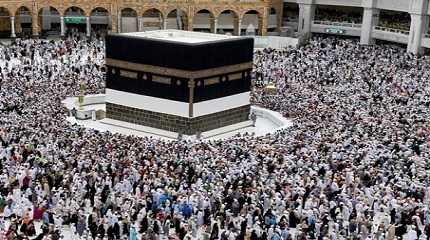
MAKKAH, June 26 (APP):The last daunting three years had witnessed a sharp reduction in the scale of annual pilgrimage amid the Covid-19 pandemic but Hajj this year is featuring a historic capacity of pilgrims, gathering in and around the Holy City to begin their lifetime spiritual journey.
More than 2.5 million pilgrims from 160 countries around the world and locals are expected to converge on Islam’s holiest mosque in Makkah.
Officials from several Islamic countries have confirmed the restoration of their Hajj quota this year to the same level as it was before the outbreak of the coronavirus pandemic.
Accordingly, the number of pilgrims from abroad for this year’s Hajj have crossed almost two million from 57 Islamic countries and more than 100 other countries with Muslim populations in all parts of the globe.
The newspapers and web portals on Sunday quoted Deputy Minister of Hajj and Umrah, Dr. Abdel-Fattah Mashat, saying that the relevant ministry was following the same mechanism that was in force before the outbreak of the coronavirus pandemic, in determining the quota of pilgrims from each country.
He stressed that the current season is unique, and all services are ready in place at the holy sites.
Mashat said there are precautionary plans on the part of the concerned authorities to deal with any health or organizational emergency that may arise during the pilgrimage, and this comes within the Saudi capabilities in managing crowds and dealing with crises.
He revealed that the concerned authorities in the Kingdom have received applications from many countries to join the Makkah Road initiative, and these applications are under study by the Ministry of Interior.
Regarding the classification of the Hajj service-providing companies and establishments, the deputy minister said these companies will be reclassified after Hajj based on the satisfaction level of the pilgrims in accordance with data from relevant evaluation forms that were posted on a major pilgrims’ platform.
“A number of leading hospitality companies were provided with the opportunity to present their competitive services. The defaulting companies will be held accountable, and there are mechanisms to compensate the pilgrims for any shortcomings they are exposed to,” he said.
Mashat said this year’s Hajj season is unique. All the preparations are well in place beforehand for all services, and there have been integration, coordination and harmony among all parties participating in the Hajj operation, he said, adding that there is joint work between the Ministry of Hajj and Umrah and all the competent authorities.
There is also cooperation in developing a coordinated operational plan for all, conducted through the Business Follow-up Office while the Central Hajj Committee does continuous follow-up of all works that take place at the operational level.
Mashat said the most important feature of this year’s Hajj is the total restoration of the pilgrims’ quota to pre-pandemic levels. He noted that the numbers will be the same that were approved before the pandemic. Similar is the case with the mechanism that the ministry followed in deciding the quota of pilgrims for each country.
According to the figures revealed by the General Authority for Statistics, the number of pilgrims who performed Hajj in 1440 (2019) exceeded 2.4 million. At the same time, the number of domestic pilgrims was estimated at about 634,000 male and female pilgrims, including 211,000 Saudis and 423,000 expatriates.
About Makkah Road initiative and its importance, Mashat said, “We have received many requests from several countries to join the initiative, and the specialized committee, headed by the Ministry of Interior, is carrying out a thorough study of all these requests in a professional way.”
The deputy minister stressed that Saudi Arabia, through its accumulated experiences over the decades, has developed ideal models for crowd management, and is able to deal with any situation. This model cannot be repeated anywhere in the world due to the circumstances of time and place and the large numbers of pilgrims who flock to Saudi Arabia through various entry ports within a matter of days.
He said there is no similar model in crowd management that moves an entire city five times — between Makkah, Madinah and the holy sites — and this accumulated experience of managing crowds cannot be found elsewhere in the world.




